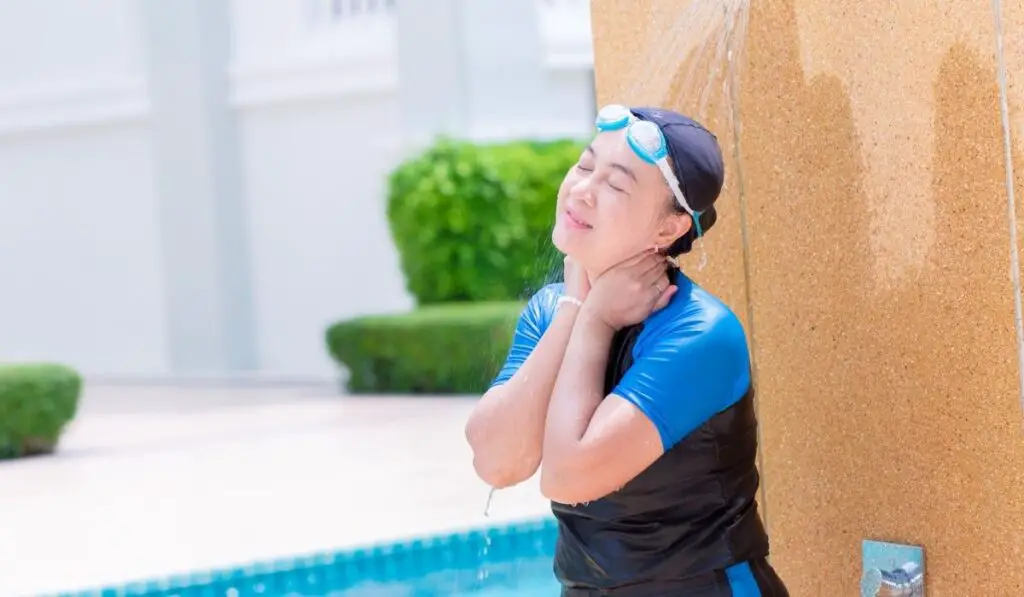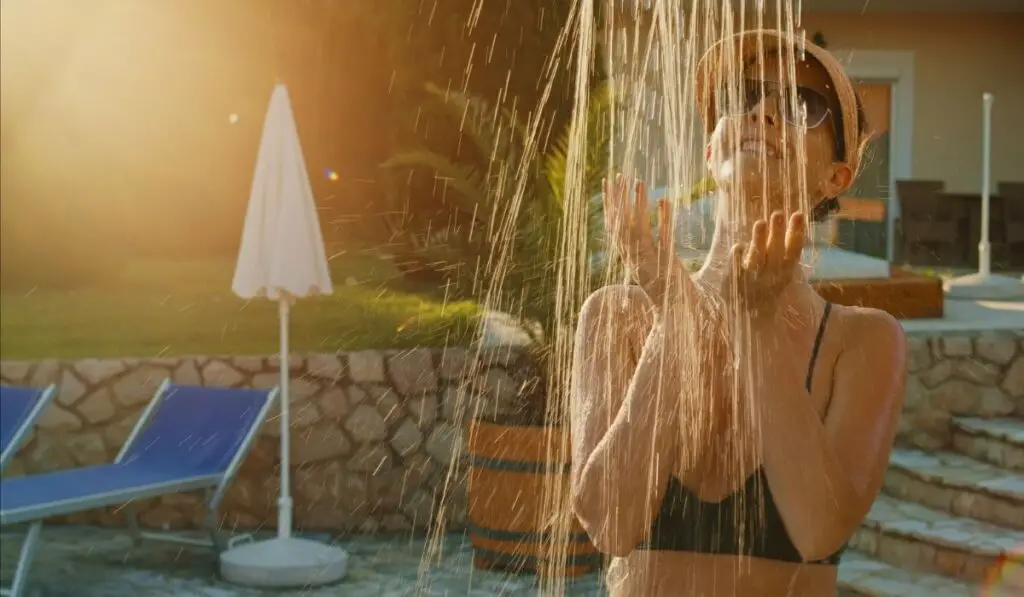Summer is here, and that means it’s time to hit the pool! Taking a quick dip, doing a few laps, and lounging in the sun is hard to beat. But did you know how important it is to shower before and after swimming? It may be obvious that you need to rinse any dirt off before you get in, but what about after?
Showering with warm soapy water after swimming is the best way to prevent skin irritation or waterborne bacterial spread (and hair damage). Also be sure to take at a brief shower before entering the pool to reduce the risk of spreading harmful pathogens, and to keep the pool generally clean.
Don’t feel ashamed if you’ve skipped a shower before or after swimming. This crucial step is easy to overlook, and you might not be familiar with the associated risks. However, pre- and post-pool showers will keep you, your loved ones, and the pool in good shape. Here’s everything you need to know about showering before and after swimming in the pool.
Do You Need to Shower With Soap After Swimming?

Most public pools require their guests to shower before they start swimming. But did you know it’s equally important to shower after you’re finished with the pool? Here are some of the reasons why:
To Prevent Infectious Disease Spread
The main reason to shower after swimming is to prevent infectious diseases. Although most pools are treated with chlorine, saltwater, or other chemicals, they can still contain harmful bacteria. Pools can contain bacteria like crypto, E. coli, giardia, and more.
Showering before and after you enter the pool with warm soapy water is the best way to prevent infectious disease. Showering can remove any harmful bacteria on your body that you picked up from the pool.
Showering afterward also reduces the risk of spreading an infectious disease or harmful bacteria to other people you come in contact with.
To Prevent Skin Rash or Irritation
The chlorine and chemicals found in pools might cause skin rash or irritation. Without a post-pool shower, the skin might become red, itchy, and dry.
People with highly-sensitive skin might have a higher risk for post-pool irritation. Showering provides an easy way to reduce the risk of rash, irritation, or sensitivity.
To Get Rid of Lingering Chlorine and Chemicals
Most conventional swimming pools use chlorine and other chemicals (example on Amazon) to kill harmful bacteria, keeping the water balanced in the process. The added chlorine kills germs that cause salmonella, E. coli, swimmer’s ear, and even diarrhea.
Showering with warm soapy water after swimming will remove the chlorine, chemicals, and any harmful bacteria that made their way through. Not only will this help you avoid getting sick, but it will also remove the chlorine smell.
To Protect Your Hair
The chlorine and chemicals found in most pools can negatively impact your hair’s health. Chlorine can strip your hair of its natural oils and irritate the scalp. Your hair might become dry and weak from too much exposure. This can lead to cracks, split ends, breakage, and changes to natural or dyed color.
People with thin to fine hair, color-treated hair, chemical-treated hair, or damaged hair are at a higher risk. One way you can avoid potential damage is by showering after swimming. Utilizing conditioners, natural oils, and gentle shampoo can also prevent damage.
This is why swimmers who do it a lot, especially women, use swim caps (example on Amazon). This doesn’t necessarily keep the hair dry, but it means it gets less chlorine on it while in the pool. You still need to rinse after, but this is just one more way to manage the chlorine/hair situation.
Is It OK to Skip the Shower After Swimming?
It might be tempting to skip the shower after taking a dip in the pool. Unfortunately, saving time by skipping the shower can result in negative health consequences. This means it’s not okay to skip showering after swimming.
Without a shower, the chemicals, chlorine, and bacteria in the pool will linger on your skin. Your skin might become dry, itchy, red, or irritated. Exposure to harmful bacteria found in pools could lead to symptoms like diarrhea, weight loss, nausea, vomiting, dehydration, and stomach cramps.
Some studies have even found links between prolonged chlorine exposure and bladder cancer. With these risks in mind, it’s safe to say that skipping a shower after swimming is not a safe or healthy decision.
What About Showering Before the Pool?
Most public pools require their guests to shower before entering the pool. Unfortunately, some people find this step unnecessary or redundant. But the truth is that showering before entering the pool is a necessary step to staying healthy, preventing infectious disease, and keeping the pool clean for everyone.
Would You Use a Stranger’s Bathwater?
The easiest way to rationalize showering before entering the pool is to ask yourself the question, “Would I use a stranger’s bathwater?” Some surveys have found that over 90% of adults would never reuse someone else’s bathwater.
Jumping into the pool without a shower is somewhat like creating dirty bathwater or using someone else’s. Unfortunately, you’re wrong if you think that chlorine will wash away all the dirt, grime, and germs. These particles don’t just disappear once you enter the water; they linger around, causing potential risks in the process.
Chlorine Can Only Do So Much
Entering the pool without a shower adds dirt, perspiration, cosmetics, body oils, and traces of urine and fecal matter to the water.
Pools contain “free” chlorine, a chemical used to destroy pathogens. The free chlorine reacts to the impurities from swimmers to form “combined chlorine” compounds.
When there are more impurities present from unwashed swimmers, there’s less free chlorine available to kill bacteria. This means there’s a greater chance for infectious disease and waterborne illness.
The best way to prevent the spread of infectious disease and waterborne illness is to shower before entering the pool. A pre-pool shower ensures you’re not lowering the levels of free chlorine in the water, protecting yourself and everyone else in the process.
Help Prevent Waterborne Illness by Showering Before and After Swimming

Although it may seem redundant, unnecessary, or tempting to skip pre- and post-pool showers, doing so can be incredibly harmful. Skipping showers before entering the pool helps keep you and others safe from waterborne illness.
Entering the pool without a shower means you’re bringing dirt, sweat, trace fecal matter, and other harmful bacteria with you. This makes the chlorine work harder, resulting in a higher risk of pathogens and infectious diseases.
When you exit the pool, the chlorine, chemicals, and harmful bacteria cling to your body. Skipping the shower can result in itchy, dry, and irritated skin. Not to mention, you might suffer from waterborne illness or spread it to someone else.
The good news is that you can help prevent and avoid waterborne illness by showering before and after swimming. Even a 60-second shower with warm water before the pool has been shown to reduce harmful bacteria.
After you exit the pool, wash off with warm soapy water, including your hair and bathing suit. You can also take a few minutes to rinse off onsite and take a longer shower when you get home.
Either way, showering before and after swimming is the best way to protect yourself and your loved ones and keep the pool clean.
